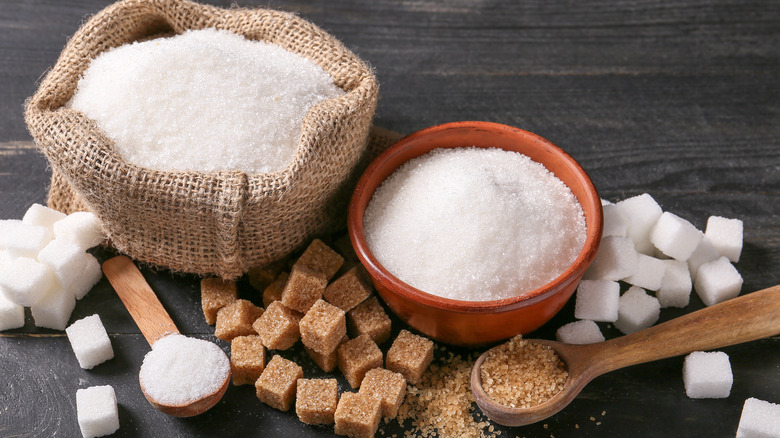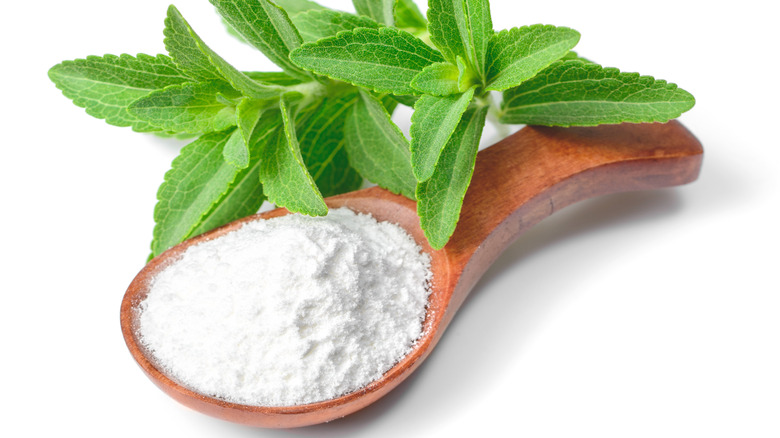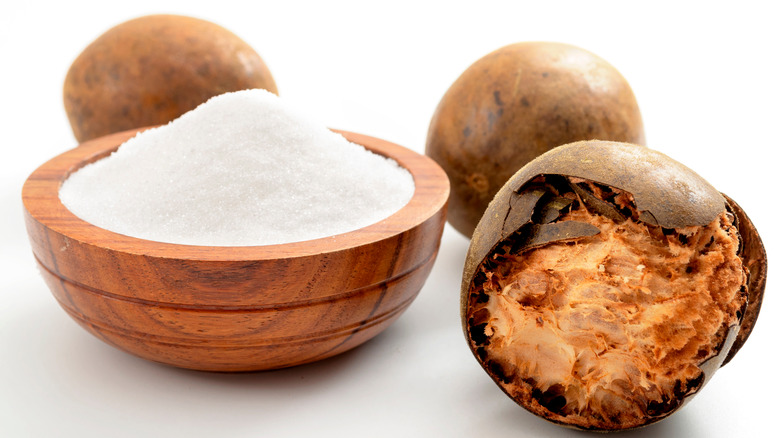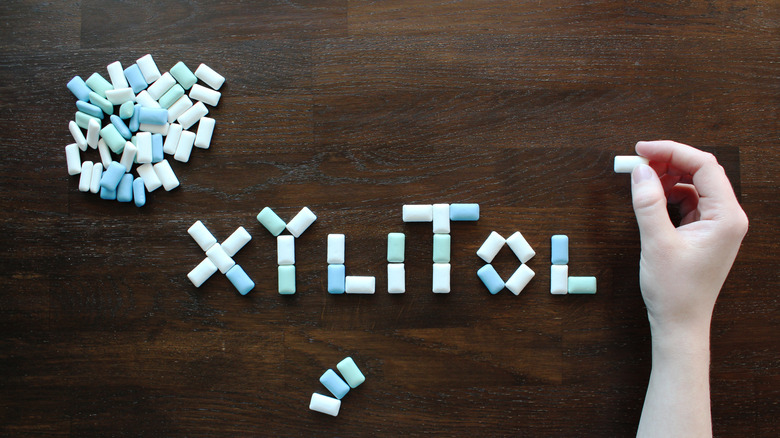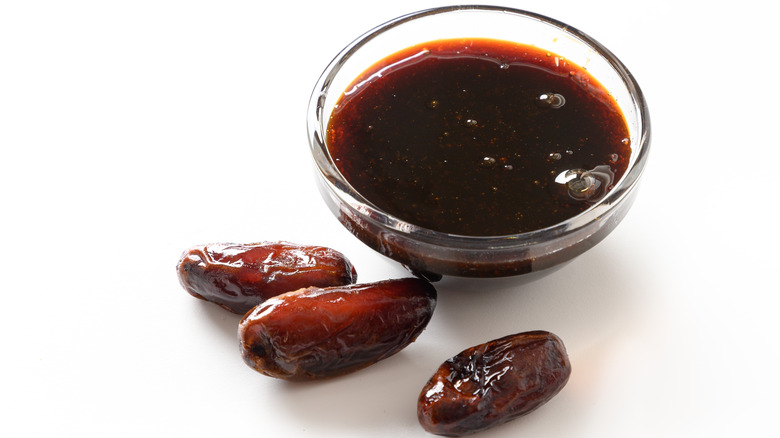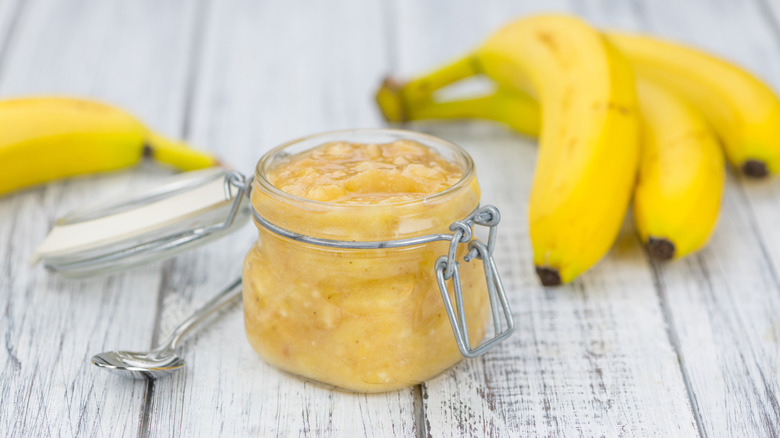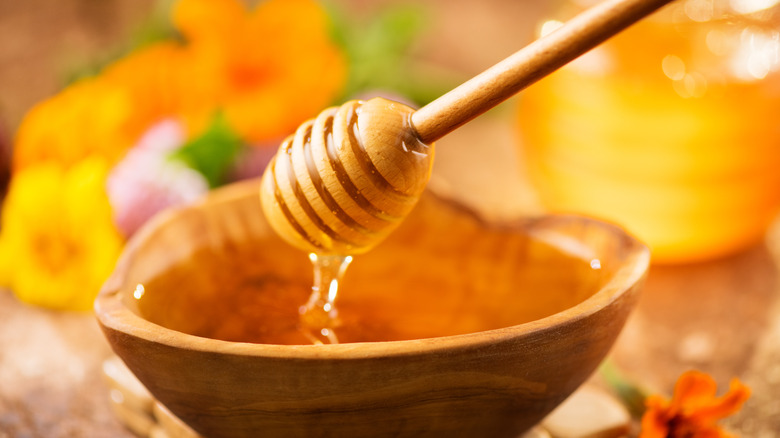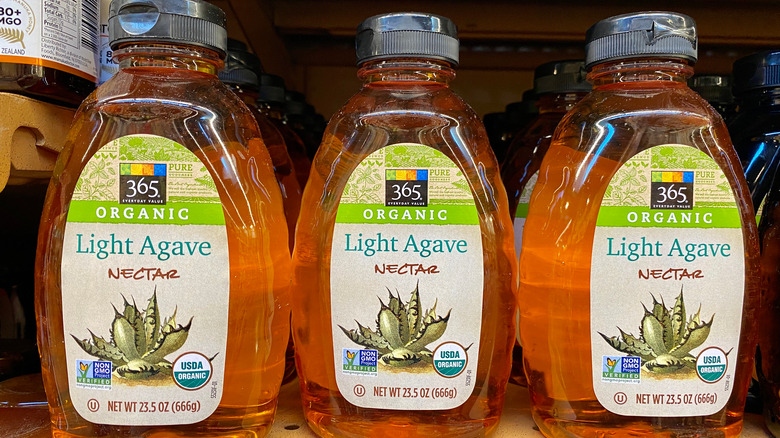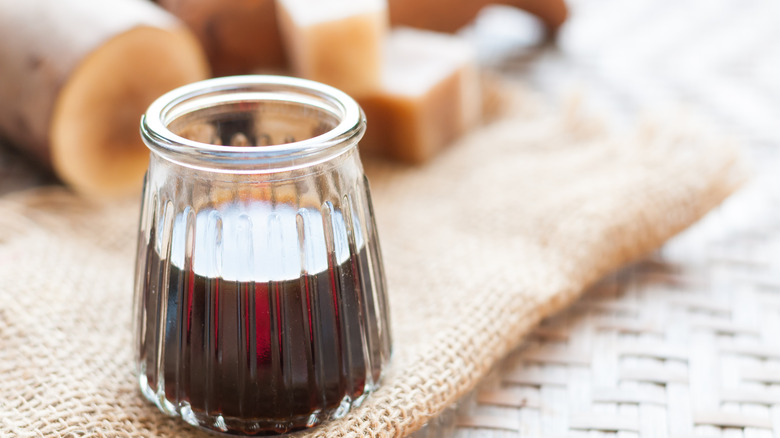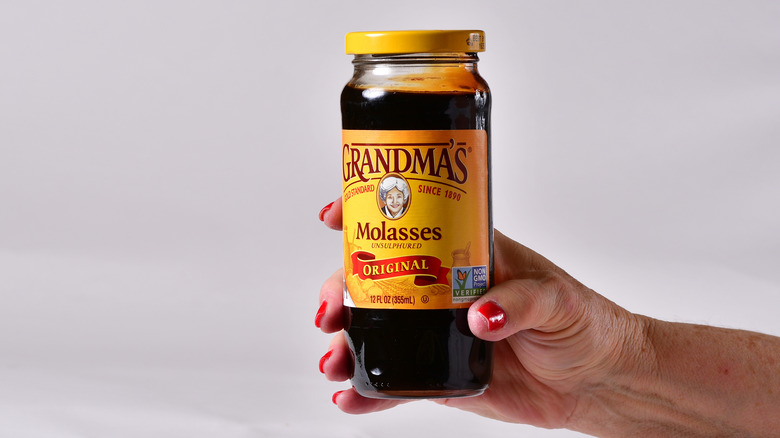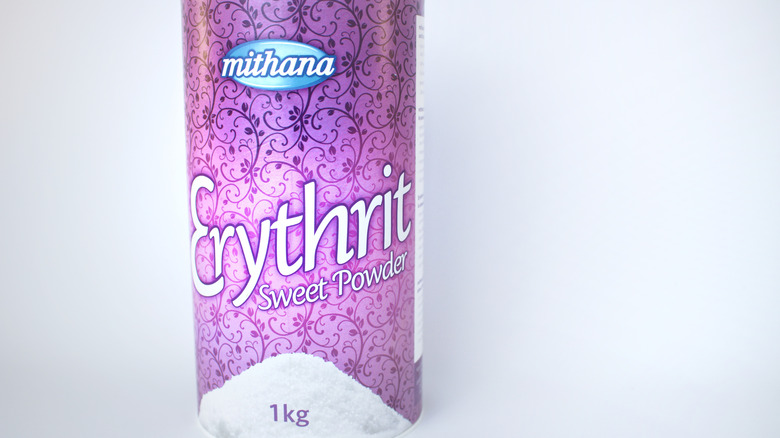10 Best Substitutes For Sugar
Sugar — or, in the chemical world, sucrose — is a naturally occurring carbohydrate that is produced in plants through photosynthesis (via The Sugar Association). You can find it in just about anything from fruits and veggies to nuts and dairy. There's also a good chance that you can find a bag of it in your pantry, though this variety, sometimes called "table sugar," is extracted specifically from sugar cane or sugar beets because they have the highest amount of sucrose among all plants.
The process of creating table sugar differs slightly depending on which of the two is at its source. However, the main steps remain the same and include extraction of a juice from the plant after its harvested, which is then crystallized, spun, and dried to ultimately become the tiny white granules that you dump by the spoonful into your morning coffee or measure out precisely for a batch of cookies. No matter what you do with it, the main reason for its use remains the same: to give your dish or drink a delicious flavor that is sweet on the tongue.
While sugar is a necessary part of our diets, it's easy to go overboard on it, especially when it sneaks its way into some foods that are traditionally seen as "healthy," like granola. If you're looking for a more nutritious way to get your fix, here are a few substitutions for the sweet stuff that you can try.
1. Stevia
Often included in a small container on your table when dining out, stevia is one possible substitution that can generally be used in the same ways that you would use sugar. The plant-based alternative comes from the leaves of a plant scientifically known as stevia rebaudiana and can be helpful for managing blood sugar levels or even weight loss, as Healthline notes that it is carb and calorie-free whereas sugar typically rings in around 45 calories per tablespoon. Stevia is also up to 300 times sweeter than regular table sugar, so you won't need as much of it for cooking or baking.
According to Veg Kitchen, ½ teaspoon of stevia is equivalent to 1 cup of sugar. However, this can differ depending on the brand as well as whether you've got the sugar alternative in powder or liquid form. Make sure to carefully read the packaging before making the swap to ensure you've got the right ratio.
It is important to note that stevia does have a slightly bitter taste, so make sure not to go overboard with this replacement. Per Stevia.org, it also does not caramelize very well or contribute to the rise of baked items like bread as regular sugar can. You can try combating any of these issues by experimenting with a mixture of stevia and another form of sweetener in your recipes.
2. Monk fruit sweetener
Monk fruit sweeteners have become a recent phenomenon in terms of sugar substitutions, though Healthline reports that they have been put to use for centuries, particularly in traditional Chinese medicine. Extracted from the small green monk fruit, this alternative packs a sweetness 100 to 250 times greater than sugar, which comes from antioxidants known as mogrosides. It is similar to stevia in that it boasts a goose egg in the calorie and carbohydrate departments but has a slight edge in that it does not have an aftertaste. Healthline also reports that some studies show that monk fruit extract can help prevent the growth of cancer cells.
Monk fruit sweetener can make an excellent replacement in things like drinks or sauces but may not fare quite as well in baked goods. Brand again plays a factor when trading in sugar for a monk fruit sweetener, but according to What Sugar Blog, a standard ratio to go by is 1/64th of the alternative for 1 teaspoon of sugar.
3. Xylitol
Xylitol is a type of sugar alcohol (though it doesn't actually contain any of the hard stuff) that can be found in fruits and vegetables. It is nearly equivalent to sugar in taste with the added bonus of having 40% fewer calories, is safe for diabetics to use, and can be beneficial for oral health. However, too much can cause some digestive issues, so don't overdo it with this sugar replacement. Keep in mind that xylitol is also not safe for dogs to consume (via Healthline). Though it may be hard, don't share treats with your pet if you've made this swap.
Xylitol should be used in a 1:1 ratio in place of sugar for some of your favorite recipes, though yeast cannot metabolize it, so skip using this substitution when making homemade bread (via Xylitol.org). It also cannot caramelize, so topping your crème brûlée with this sugar substitute will not work out either.
4. Dates
Sometimes referred to as "nature's candy," dates are another source of sweetness that are also high in fiber, meaning they will give you some major nutritional benefits when replacing refined sugar. You can find dates in a variety of forms at the store, including sugar or syrup. Of course, they are also available in their natural state, which resembles a large raisin and, according to Organic Authority, can be turned into a paste by puréeing 1 cup of pitted dates with ½ cup of hot water. Each form can be used in a different manner, though dates generally work in both sweet and savory applications.
According to The Kitchn, date sugar can be used as a one-to-one replacement for both white sugar and brown sugar in baking, while date syrup should be used a bit more sparingly at ⅔ cup for one cup of sugar. Use a combination of 1 cup date paste and 2 tablespoons of liquid in place of 1 cup of sugar, per Food52.
5. Bananas
It seems like everybody whipped up a batch of banana bread at least once over the course of the last year, but the potassium-rich fruit can be used in place of white sugar in a much wider array of baked goods. Simply throw one or two of the ripened yellow guys into a food processor with a bit of water to make a smooth puree that adds a delightful sweetness to your favorite recipes that's also full of nutrients. Frozen bananas are also a great natural sweetener in smoothies, and can even be an alternative to ice cream — a swap that has appropriately been labeled "nice cream."
But Food52 reminds us to take into account the amount of moisture in bananas when using them in place of the granulated stuff in recipes for baked goods. Cut the amount of sugar in half and replace it with ripe, mashed bananas for this substitute.
6. Honey
You've likely drizzled some honey over a biscuit or in a cup of tea, but did you know that honey can also be used in place of sugar in your favorite baked goods? Sure, it doesn't cut down on the calorie count of the treat, but honey is chock-full of antioxidants that may help prevent diabetes and cancer. The sticky-sweet liquid favored by Winnie The Pooh is generally sweeter than regular granulated sugar and will add a unique floral taste to your finished product as well.
Because honey overpowers sugar in sweetness, it should be used in a ratio of ½ to ¾ of a cup for every cup of white sugar called for in a recipe — but that's not all. Baker Shauna Saver told The Kitchn that for every cup of honey used, you'll need to add in ¼ teaspoon of baking soda and reduce the number of liquids on your ingredient list by ¼ cup to combat its acidity and water content, respectively. Saver also advised to reduce the temperature of your oven by 25 degrees and to check what you're making "early and often" because honey's higher sugar content can potentially result in your baked goods burning.
7. Agave
If you're any kind of liquor connoisseur you've likely heard of agave once or twice. The plant serves as the base for tequila, but it also produces a sweet syrup that can be likened to honey. Similar to the stuff from bees, agave syrup (or nectar, as it's sometimes referred to) is sweeter than regular sugar and higher in calories. It also loses a lot of its nutritional value because it must be processed for consumption.
This sugar alternative is also incredibly high in fructose, so it's not necessarily a healthier option. However, because of this, Vegetarian Times notes that agave falls low on the glycemic index, making it a suitable substitution for those needing to monitor their blood sugar levels.
When making the swap in a recipe, Food52 suggests using ⅔ the amount of agave in place of sugar, while also reducing liquids by ¼ cup. Vegetarian Times also explains that (as with honey) you'll want to set your oven 25 degrees lower than the recipe instructs to prevent browning, and may need to slightly increase the baking time.
8. Yacon syrup
Though only a single letter off from bacon, this sugar alternative is actually pronounced "yuh-kown" and is far from savory. Deriving from the roots of yacon plants, which are native to the Andes mountains, the syrup derivative is similar in color and consistency to molasses, it tastes similar to caramel but is only half as sweet as honey. The product is rich in prebiotics and has only a third of the number of calories found in sugar. Some research suggests that it can be a tool for weight loss, though overconsumption can lead to a few side effects like abdominal pain and diarrhea (via British Dentist Journal).
Yacon syrup can be used in savory applications, such as salad dressings or marinades, as well as in baked goods — though the heat will remove its prebiotic properties. If using as a substitute for table sugar, The Big Carrot suggests using ⅔ cup yacon syrup for 1 cup of sugar.
9. Molasses
Molasses is a key ingredient in some favorite holiday recipes like gingerbread cookies, but it can also make an excellent replacement for sugar year round — it is a byproduct of the sugar refining process after all. The thick syrup can be used in baked goods and also lends its flavor to a few savory items such as baked beans. However, it is important to note that there are a few varieties of this product. Blackstrap molasses, Chatelaine notes, has been boiled two times more than light molasses, giving it a bitter taste that makes it unfit for replacing sugar in recipes.
After making sure you have the proper form of the product, you can use a 1:1 ratio when using it as a replacement for sugar while also reducing the number of liquids by ¼ cup (via King Arthur Baking). If the recipe does not call for any liquids, add 1 tablespoon of flour for every ¼ cup of molasses.
10. Erythritol
Erythritol is another type of sugar alcohol that is naturally found in fruits, though it has some major differences from the aforementioned xylitol. According to Healthline, it contains 0 calories, making it a potential aid in weight loss that will not cause the same digestion issues. Another major difference is its taste. Unlike xylitol — and most of the substitutes included in this list, for that matter — erythritol is actually less sweet than sugar, so you will need more of it when using it as a replacement in recipes.
Some may find it to have a slight cooling sensation, which Intoxicated On Life suggests can be combated with the addition of a bit of stevia. Erythritol can be found in both granulated and powder forms, the latter of which is favored more because it dissolves better in liquids. Again, as erythritol only has about 70% of the amount of sweetness that sugar has, so Very Well Fit suggests using about ¼ cup more than the amount of sugar called for in a recipe.
